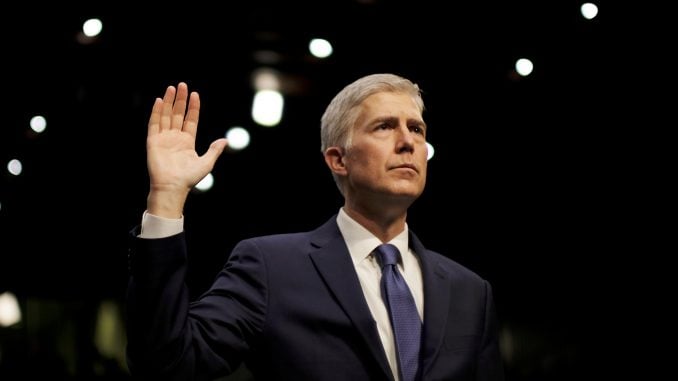
WASHINGTON, D.C. The Republican-led Senate on Friday gave Donald Trump the biggest triumph of his young presidency, confirming his Supreme Court nominee restoring a conservative majority on the highest U.S. judicial body.
The Senate voted 54-45 to approve Republican Trump’s pick, Colorado-based federal appeals court judge Neil Gorsuch, to the lifetime job. Three Democrats joined the Republicans in voting for Gorsuch.
Gorsuch’s confirmation ends the longest Supreme Court vacancy since 1862 during the American Civil War, with the court down a justice for almost 14 months since long-serving conservative Justice Antonin Scalia died on Feb. 13, 2016.
Landmark cases concerning religion, guns and big business are just ahead of Judge Neil Gorsuch, highlighting his importance as the fifth conservative on a nine-justice court. Among them is an appeal from N.C. on the constitutionality of the state’s voter ID law, which was blocked by a lower court.
There are also appeals pending on expanding gun rights to include carrying concealed firearms in public and allowing business owners to object on religious grounds to serving gay couples. All could lead to landmark rulings if taken up.
On April 17, the justices will begin hearing a new round of oral arguments, including a closely watched case on the separation of church and state focusing on whether a Missouri church was improperly denied state funds. The court is nearing the end of its current term, which runs from October to June.
Gorsuch also would play a key role in important cases the justices already have agreed to hear in their next term, including a bid by employers to prevent workers from bringing class action claims, a goal of big business.
Major issues before the court highlight the significance of Gorsuch filling Scalia’s seat and restoring the court’s 5-4 conservative majority. Senate Republicans refused last year to consider former President Barack Obama’s nomination of judge Merrick Garland to fill the vacancy, which would have given the court a liberal majority for the first time in decades.
Legal experts suspect a conservative majority on the court could motivate conservative lawyers to bring cases in a hope that five justices will back abortion restrictions, oppose political spending limits, and favor wider gun and religious rights.
Justice Anthony Kennedy, a conservative who sometimes sides with the four liberals, will remain the court’s swing vote. Most experts expect Gorsuch to be more aligned with the court’s two conservatives, Samuel Alito and Clarence Thomas.
PENDING APPEALS
With four votes needed to take up a case at the private meetings, each justice is important. Among pending appeals the court is likely to act on in the coming weeks is a case in which activists have asked the justices to rule for the first time that the U.S. Constitution’s Second Amendment, which protects the right to bear arms, extends to carrying firearms outside the home. The justices also could hear a Christian baker’s religious claim that he should not be forced to sell a cake to a gay couple.
Conservative justices generally take expansive views of gun and religious rights and may back state laws whose Republican backers say are intended to prevent voter fraud.
On April 19, the court will hear a religious rights case in which a church contends Missouri violated the Constitution’s guarantee of religious freedom by denying it funds for a playground project due to a state ban on aid to religious organizations.
Gorsuch has ruled several times in favor of expansive religious rights during his decade as a judge.
“Given Gorsuch’s solicitude for religious liberty, his joining the court can only help the church,” said Ilya Shapiro, a lawyer with the libertarian Cato Institute think tank.
There are several cases the court has already heard but has not yet decided in which Gorsuch could play a role. The court has the option of hearing fresh arguments, with Gorsuch in a position to cast a potential deciding vote.
One such case is a bid by Miami to revive lawsuits accusing major banks of predatory mortgage lending to black and Hispanic home buyers. Another is whether the family of a Mexican teenager can sue a U.S. Border Patrol agent who fatally shot the 15-year-old from across the border in Texas.
The court is also likely to weigh in on whether transgender students are protected under a federal law prohibiting sex discrimination in education. The court took up that question last fall but in March sent the case back to a lower court without resolving the main legal question.



